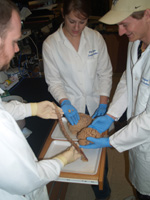High school psychology class gets
brainy
by Mary Helen
YarboroughPublic Relations
A local high school psychology class at the Charleston County School of the Arts (CCSOA) got a visit from some real brains recently.
A cerebral talk by College of Graduate Studies (CGS) doctorate students Tim Whitfield and Alicia Saylor, and Neurosciences postdoc Jason Rogers, included a discussion of how the brain works and responds to illnesses.
 Dr. Jason Rogers,
left, and doctoral students Alicia Saylor and Tim Whitfield show the
brains and spinal column they took to the Charleston County School of
the Arts.
Dr. Jason Rogers,
left, and doctoral students Alicia Saylor and Tim Whitfield show the
brains and spinal column they took to the Charleston County School of
the Arts. These magnet school students weren’t shown mere images of brains; they got to see and feel real brains—one from a human who had Alzheimer’s disease and the tiny brains of a rat and a mouse.
The boys and girls, not much younger than their visiting teachers, held the brains and studied the crevasses. They learned the look of a sick brain, and how much scientists know about humans by studying the brains of rats and mice.
In letters written to their MUSC visitors, students expressed relief that laboratory rats and mice are treated humanely.
“They didn’t know that we were helping addicted people by experimenting on rats,” Rogers said. “They learned the reason why we do animal research and that we’re not torturing them.”
Students echoed a sentiment of intrigue and inspiration over the field of neurosciences, and they discovered that being a scientist can be “cool.”
“We definitely planted the seeds,” Rogers added. “Most of these kids had not been exposed to neurosciences. …They have questions, and they know that without questions there would be no research.”
The CCSOA visitation program started when psychology teacher Bill Smyth contacted Jacqueline McGinty, Ph.D., CGS associate dean and neurosciences professor.
“This was a great introduction to a class that had not been taught about the physiology of the brain,” said McGinty. “It was terrific for these students to actually see the relationship between what they were learning in psychology and the physiology of the brain.”
The relationship between CCSOA and MUSC began six years ago when McGinty was contacted by a teacher requesting a visit by MUSC scientists during Brain Awareness Week. “Nobody was doing anything related to neuroscience, so we started to organize events,” McGinty said. “Since then, the students have voluntarily kept the program going.”
Saylor has been visiting area junior and high schools for all six years. The Pittsburgh native said the experience is mutually beneficial.
“I wanted to teach,” Saylor said. “That’s the thing that’s guided me. The inspiration goes both ways. Their excitement is obvious.”
Whitfield said that visiting the school and students provides a break from the confines of the lab.
“In the lab, you’re so focused,” Whitfield said, “Sometimes, you need to go outside of the lab and talk to regular people. When you do, it brings you back to a basic level that reminds us why what we’re doing is important.”
MUSC’s six colleges have a well-established relationship with area schools where many students have visited and honed their teaching skills for years. Students and faculty also have served as ambassadors for MUSC, and the fields of research and medical science.
Comments from students
- “It was really interesting hearing about your research at MUSC. It really wasn’t a boring discussion and I was really into it. I have always been one that is against testing on animals, but for once I understand that it is necessary.”—Haley
- “It was a cool and neat experience (kind of freaky, too) to actually touch a human brain. I was expecting a boring professor … to come in and put me to sleep, but that wasn’t the case. You all were really cool and interesting, and you made the class fun.”—Francisco
- “Since my mom had a neurological disease, I’ve also been very preoccupied with neurology, especially the peripheral nervous system. Your visit helped me not just understand my passion better, but understand my mom better.”—Lauren
- “I went home and tried to sound half way brain intelligent. It didn’t go as well as planned.”—Courtney
- “I had no idea that a human brain looked and felt so weird. Before you all came, I thought about becoming a medical student, but you all changed my mind. Hopefully, I’ll pursue a career in another medical field. I hope that’s not the last time I get to touch a brain… .”—Alecia
Friday, Nov. 16, 2007
Catalyst Online is published weekly,
updated
as needed and improved from time to time by the MUSC Office of Public
Relations
for the faculty, employees and students of the Medical University of
South
Carolina. Catalyst Online editor, Kim Draughn, can be reached at
792-4107
or by email, catalyst@musc.edu. Editorial copy can be submitted to
Catalyst
Online and to The Catalyst in print by fax, 792-6723, or by email to
catalyst@musc.edu. To place an ad in The Catalyst hardcopy, call Island
Publications at 849-1778, ext. 201.